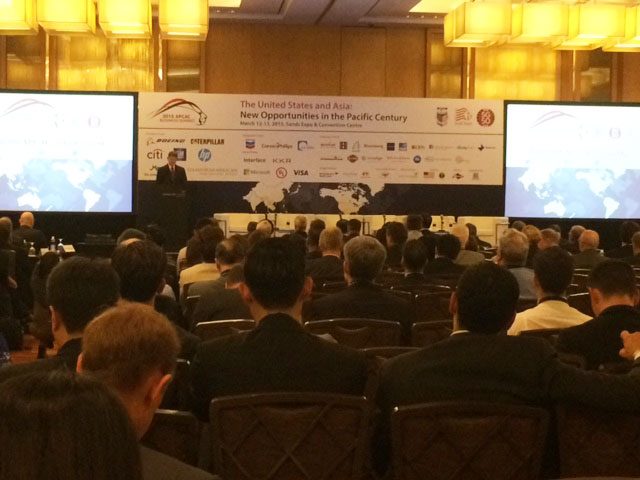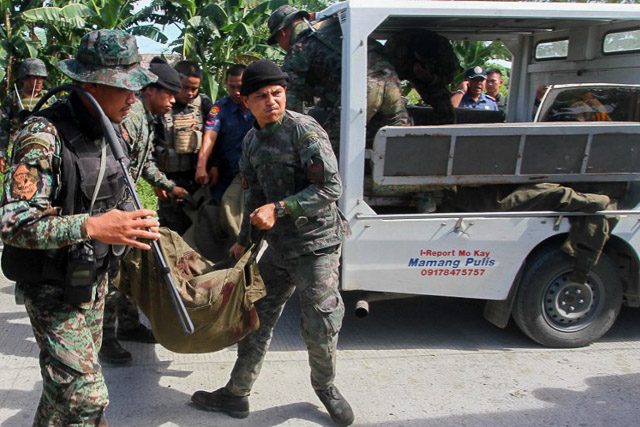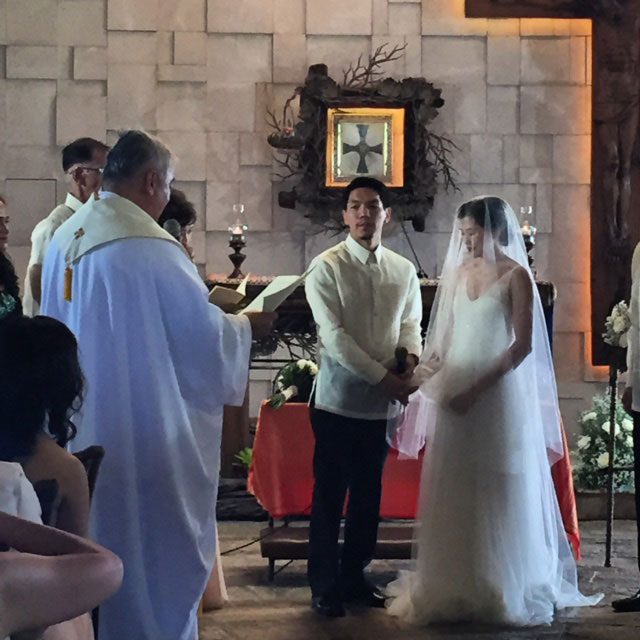SUMMARY
This is AI generated summarization, which may have errors. For context, always refer to the full article.

It’s been a packed 3 days – from Singapore to Tagaytay: to the big picture politics and economics of Asia-Pacific; to the Mamasapano report and the essence of leadership; and the wedding of one of the brightest and persistent of our 3rd generation Rapplers. (I joke the digital world moves so fast that we’re like Drosophila melanogaster – fruit flies used in genetic experiments because they breed generations in a day).
Strangely, at the core of these seemingly unrelated events, the themes are the same: courage and love.
How did I get to that? By watching The Theory of Everything on the flight from Singapore to Manila, a movie about the life and ideas of Stephen Hawking, a brilliant scientist who wanted to distill the world into one simple, elegant equation.
Diagnosed with ALS, a degenerative motor neuron disease, when he was 21 years old, his mind is trapped in a body he cannot control. The simplest things we take for granted, like eating a meal or moving a finger, he cannot do, but his insatiable curiosity about the world allows him to bridge the gap between knowledge and reality to explore questions about the beginning of time and the existence of God.
“The universe is expanding,” Hawking says in the movie. “If you reverse time, then the universe is getting smaller. What if I reverse the process all the way back to see what happened at the beginning of time itself? Wind back the clock until you get a universe born from a black hole explosion.”
His first wife, Jane, meets and falls in love with him shortly before he’s diagnosed, and she decides that together they will fight the disease. It took courage for Stephen to face the doctor’s diagnosis that he had just two years to live. It took courage for Jane to believe her love could make a difference.
They marry and have 3 children – their love carrying them through years where Stephen’s condition degenerates, from walking with a cane, to two canes, then a wheelchair. In the movie, you can feel the business of living, the day-to-day challenges weighing on Jane, straining their love.
A choir master, attracted to Jane, becomes a family friend and helps her with the daily tasks, becoming a surrogate father to the children and a friend to Stephen. At a crucial moment, Jane is confronted with a decision: should she remove life support and essentially kill Stephen or go through a tracheotomy that will remove his ability to speak and isolate him even more? She chooses his life and cuts contact with the choir master.
Courage is about doing the right thing even if it’s the wrong time.
It’s about standing up for what you believe in no matter the cost. As a warzone correspondent, courage was about going in when others are leaving and staying with the story because being there makes a difference. It’s about leadership: being responsible for the actions and the lives of your team – and because you take that responsibility, making sure your choices go beyond your personal preferences. As the head of a news group, it’s about standing up to vested interests of powerful groups – from owners to politicians to corporations and lobby groups.
But the courage Hawking’s life demands is a challenge I was afraid I would fail: the courage to be there through the painful, back-breaking choices and moments of repetitive, seemingly futile actions like eating a meal, taking a bath or even just communicating a thought.
It is painful, real, and extremely thought-provoking about the nature of courage and the strength of love – because that is what keeps you through those painful, demanding moments in our lives.
Which reminded me that the strength of leadership begins at home.
Courage is personal
The courage of leadership is personal: it is showing up, being there, committing to do the difficult, simple, repetitive tasks and having the courage to do the right thing even when it isn’t what you want to do.
It is being able to make life and death decisions: to have the ability to set aside your selfish interests so you can help the people you love live better lives.
Which brought me to the leadership of the Philippines and the Mamasapano report, a police investigation into a special forces operation that killed its terrorist target and 67 other people.
There are hard decisions leaders of nations make. Singapore’s Lee Kuan Yew focused on development above all, putting ministers – friends – in jail in his fight against corruption. Leadership like this works when it’s transparent, even-handed and does not protect anyone.
The Aquino administration made some tough calls in 5 years – like the impeachment of a Supreme Court chief justice and its anti-corruption drive, but a leader’s greatest strength is also his greatest weakness.
For President Aquino, it’s his loyalty to his friends, blinding him to the expertise of others trained to act. His two greatest tests of leadership bookmark his time in office: the Luneta bus hostage siege in 2010 and Mamasapano in 2015.

I wrote a scathing editorial after the bus hostage crisis 5 years ago when he circumvented the chain of command (it’s not only a military or police concept, by the way) and sidelined people who were trained to deal with that crisis. The result: tourists dead and foreign policy hostaged.
Now in Mamasapano, Mr Aquino again circumvented the chain of command, and you don’t need a BOI report to tell you that. His inner circle forgives him his propensity to stand by his friends, but not holding him accountable means leaving the nation to flounder in the morass of blame and perhaps doom a 17-year peace process.
This means Mr Aquino squanders his political capital – needed to pass the Bangsamoro Law and crucial for the Liberal Party’s candidate for the 2016 presidential elections. No Bangsamoro Law means security issues which are sure to impact our GDP. Of course, we know much is at stake in 2016. Because our institutions are weak, whoever’s elected president will have great impact on policies at a time of global creative destruction, partially triggered by technology and global challenges like climate change.
It takes courage and leadership to stand up and take responsibility. Why would a leader do that? Because of love – of nation, of institutions, of the men whose lives depend on his decisions.
That brings us to our wedding in Tagaytay, a volcano within a lake within the crater of another volcano. (Like all things in the Philippines, it’s complex.) There we watched Rappler’s Pia Ranada marry Andrew Robles – may the two climbers reach new heights. During the homily, the priest said, “You must die a little every day, but only in your isolation so that you may become two.”

It’s a commitment to let go of selfishness and sacrifice for the greater good of their unit, their family, because enlightened self-interest can only carry you so far. We must let go of our ego.
It reminded me of The Empty Mirror, which essentially said you know your ego is out of the way if you can look at a mirror and not see your image – meaning you’re free to see the world behind you that would’ve otherwise been blocked by your reflection.
Release the tether to our egos and risk true love.
Which brings us to God.
Beyond self-interest
Jane believed in God. Stephen used science to first disprove then prove then disprove God existed. Most religions preach a faith that leads people to acts of great sacrifice and generosity. (Jan van der Wettering wrote The Empty Mirror after spending time in a Japanese Zen Buddhist monastery.)
Faith preaches love beyond self-interest.
Faith says let go of your self in a relationship. Let go of your vested interests if you’re a leader. Why? Because it’s for your family. For your society. For the common good.
Because there is a God.
But what if there is no God?
At the end of the movie, Hawking is asked: “You have said you do not believe in God. Do you have a philosophy of life that helps you?”
Here’s his response:
It’s clear that we are just an advanced breed of primates on a minor planet orbiting around a very average star in the outer suburb of one among a hundred billion galaxies, but ever since the dawn of civilization, people have craved for an understanding of the underlying order of the world.
There ought to be something very special about the boundary conditions of the universe, and what can be more special than that there is no boundary? And there should be no boundary to human endeavor.
We are all different. However bad life may seem, there is always something you can do and succeed at. While there is life, there is hope.
While there is life, there is hope.
I love that – especially coming from Hawkings, who’s had the courage to “defy every expectation both scientific and personal.”
My theory of everything (in 3 days)? Our world demands courage and love – the courage to commit, to stay the course, to do the hard things that build character and integrity. That comes from love – of your partner, your family, your friends, your company, your nation.
No matter how bad things get, we need to fight the toxicity of cynicism and outrage because in the end, when the outrage is done, it leaves nothing but a black hole. – Rappler.com
Courage vector via Shutterstock
Add a comment
How does this make you feel?
There are no comments yet. Add your comment to start the conversation.